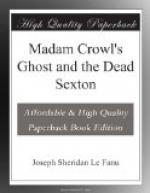Not many, we may be sure; for the good lady had not heard more than six from any other divine for the last twenty years.
The personages of Golden Friars talked Toby Crooke over on his return. Doctor Lincote said:
“He must have led a hard life; he had dried in so, and got a good deal of hard muscle; and he rather fancied he had been soldiering—he stood like a soldier; and the mark over his right eye looked like a gunshot.”
People might wonder how he could have survived a gunshot over the eye; but was not Lincote a doctor—and an army doctor to boot—when he was young; and who, in Golden Friars, could dispute with him on points of surgery? And I believe the truth is, that this mark had been really made by a pistol bullet.
Mr. Jarlcot, the attorney, would “go bail” he had picked up some sense in his travels; and honest Turnbull, the host of the George and Dragon, said heartily:
“We must look out something for him to put his hand to. Now’s the time to make a man of him.”
The end of it was that he became, among other things, the sexton of Golden Friars.
He was a punctual sexton. He meddled with no other person’s business; but he was a silent man, and by no means popular. He was reserved in company; and he used to walk alone by the shore of the lake, while other fellows played at fives or skittles; and when he visited the kitchen of the George, he had his liquor to himself, and in the midst of the general talk was a saturnine listener. There was something sinister in this man’s face; and when things went wrong with him, he could look dangerous enough.
There were whispered stories in Golden Friars about Toby Crooke. Nobody could say how they got there. Nothing is more mysterious than the spread of rumour. It is like a vial poured on the air. It travels, like an epidemic, on the sightless currents of the atmosphere, or by the laws of a telluric influence equally intangible. These stories treated, though darkly, of the long period of his absence from his native village; but they took no well-defined shape, and no one could refer them to any authentic source.
The Vicar’s charity was of the kind that thinketh no evil; and in such cases he always insisted on proof. Crooke was, of course, undisturbed in his office.
On the evening before the tragedy came to light—trifles are always remembered after the catastrophe—a boy, returning along the margin of the mere, passed him by seated on a prostrate trunk of a tree, under the “bield” of a rock, counting silver money. His lean body and limbs were bent together, his knees were up to his chin, and his long fingers were telling the coins over hurriedly in the hollow of his other hand. He glanced at the boy, as the old English saying is, like “the devil looking over Lincoln.” But a black and sour look from Mr. Crooke, who never had a smile for a child nor a greeting for a wayfarer, was nothing strange.




